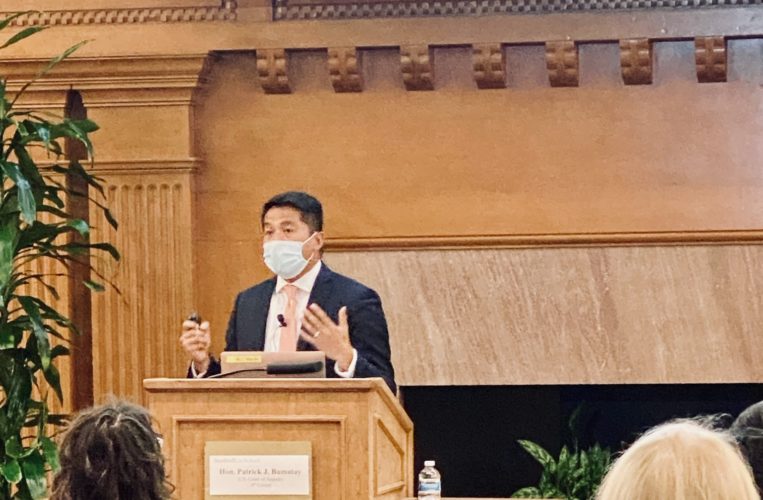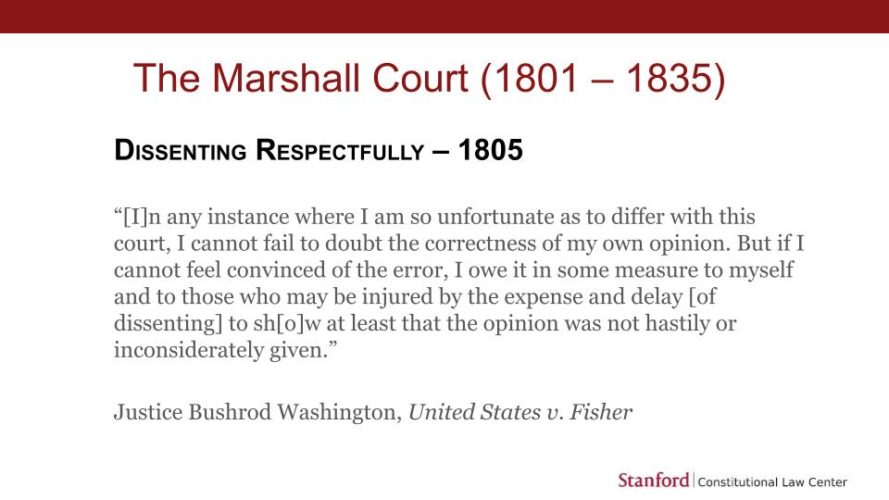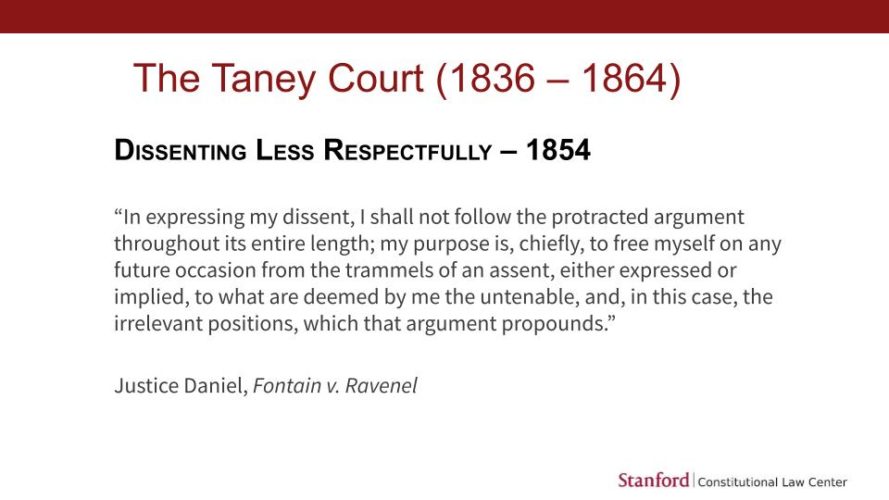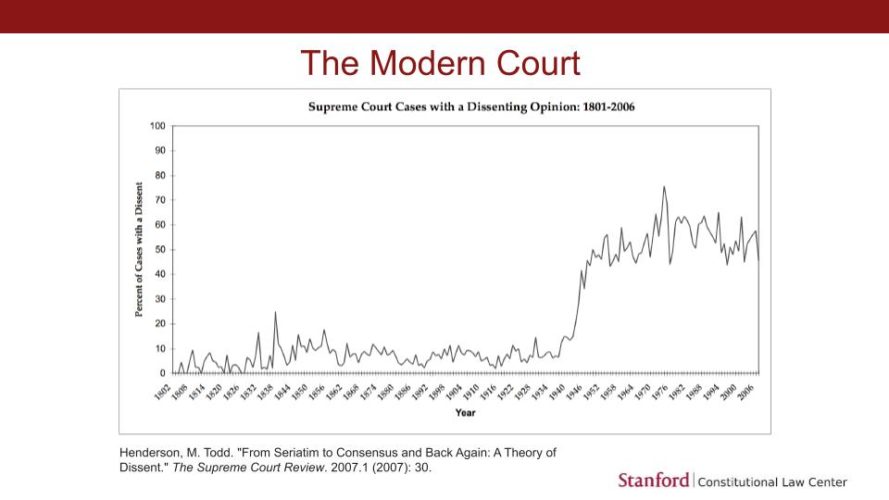Constitution Day 2021: The Value of Dissent
September 17, 1787: this date may seem like any other, but it stands out, particularly to those in the legal field. Its significance? The birth of the U.S. Constitution. Catalyzed by ratification in state conventions, it paved the way for governing a country regarded as the birthplace of modern democracy.

While not a well-recognized holiday like the Fourth of July, Constitution Day is celebrated by all academic institutions that receive federal funds, including Stanford. This year, Stanford Law School hosted an in-person Constitution Day event featuring a lecture by the Honorable Patrick J. Bumatay, a circuit judge on the U.S. Court of Appeals for the Ninth Circuit. Following the address was a short Q&A to expand on the focal points of the judge’s presentation and provide an opportunity for him to converse with the 100+ audience members.
Dissent + Civil Discourse = Democracy
“While dissent in a democracy is necessary, it must also serve as a catalyst for respectful dialogue and debate” – this was the essence of Judge Bumatay’s speech. And, as a group of students walked out of the event to protest Judge Bumatay’s record, he saluted the protestors’ right to “dissent” and, in line with the focus of his address, invited them to return for a constructive discussion.
Judge Bumatay’s address began with his personal story of immigration, diversity, and breaking barriers as the first Filipino-American Court of Appeals judge and the first openly LGBTQ+ judge on the Ninth Circuit. With a nod to his personal history, Judge Bumatay acknowledged the significance of vigorous dissent in furthering the benefits of the legal system and democracy as a whole. He explained the importance of its use in appellate courts, such as greater transparency and increased constitutional dialogue, before delving into the history of dissent.
The History of Judicial Dissent
“History will show that dissent is critical to facilitating Constitutional dialogue, not just within courts but between the courts and other branches of government and the people.”
Judge Bumatay noted that the audience may be surprised that the U.S. Constitution says nothing about the structure of judicial opinions, including writing concurrences and dissents. During his speech, the judge outlined the history of dissent in parallel to the development of the U.S. judicial system — how dissent has developed since the founding of the country, the various functions it serves and what it reflects about society. Judge Bumatay walked through the origin of dissent, stemming from the British tradition of “seriatim” or orders from the Court of the King’s Bench in 12th century England, to the early U.S. Supreme Court (SCOTUS) in the 1700s through the respectful dissents in the Marshall Court and less respectful dissents in the Taney Court, all the way to today’s SCOTUS.
The Marshall Court

Judge Bumatay reviewed the period under the fourth SCOTUS Chief Justice, John Marshall, highlighting the court’s 93 percent of unanimous decisions and mentioning Justice William Johnson, the first frequent SCOTUS dissenter.
The Taney Court

Judge Bumatay then reviewed the increase in dissension, including less respectful dissents, and some with no explanation, under Roger Brooke Taney, the fifth Chief Justice of SCOTUS.
The Modern Court

And, finally, Judge Bumatay reviewed the increase in published dissents in the modern Court, focusing on Justice Ginsburg’s reputation for powerful and respectful dissent as well as other dissenters who continue to provide thoughtful dissenting opinions that have impacted the courts, government and society.
Judge Bumatay ended his address with an appeal to the audience: “It is well known that Justice Ginsburg and Justice Scalia vehemently disagreed on the outcome of many cases. It is also well known that they regarded each other as the best of friends. Let their enduring friendship serve as a reminder that there is more that unites us than divides us.”
About the Honorable Patrick J. Bumatay
Patrick Bumatay is a recently appointed Circuit Judge on the U.S. Court of Appeals for the Ninth Circuit. He is one of the youngest appellate judges in the country, the first Filipino-American Court of Appeals judge, and the first openly LGBTQ+ on the Ninth Circuit. Judge Bumatay earned his B.A., cum laude, from Yale University and his J.D. from Harvard Law School.
Prior to his appointment, Judge Bumatay served as an Assistant United States Attorney in the U.S. Attorney’s Office for the Southern District of California, where he was a member of the Appellate and Narcotics Sections. He also served as a Counselor to the Attorney General on criminal law issues, including on national opioid strategy and combating transnational organized crime.
Judge Bumatay has also worked in the Office of the Deputy Attorney General, the Office of the Associate Attorney General, and the Office of Legal Policy. He clerked for the Honorable Timothy M. Tymkovich of the U.S. Court of Appeals for the Tenth Circuit and for the Honorable Sandra L. Townes of the U.S. District Court for the Eastern District of New York.
About the Stanford Constitutional Law Center
The Stanford Constitutional Law Center focuses particularly on the separation and scope of legislative, executive, and judicial powers; the structure of constitutional democracy; the freedoms of speech, press, and religion; and the right of privacy, including the privacy of personal data in a digital world. Founded in 2006 by former Dean Kathleen Sullivan, the Constitutional Law Center is currently led by Faculty Director Michael W. McConnell, Richard and Frances Mallery Professor of Law.
About Stanford Law School
Stanford Law School is one of the nation’s leading institutions for legal scholarship and education. Its alumni are among the most influential decision makers in law, politics, business, and high technology. Faculty members argue before the Supreme Court, testify before Congress, produce outstanding legal scholarship and empirical analysis, and contribute regularly to the nation’s press as legal and policy experts. Stanford Law School has established a model for legal education that provides rigorous interdisciplinary training, hands-on experience, global perspective, and focus on public service, spearheading a movement for change.

